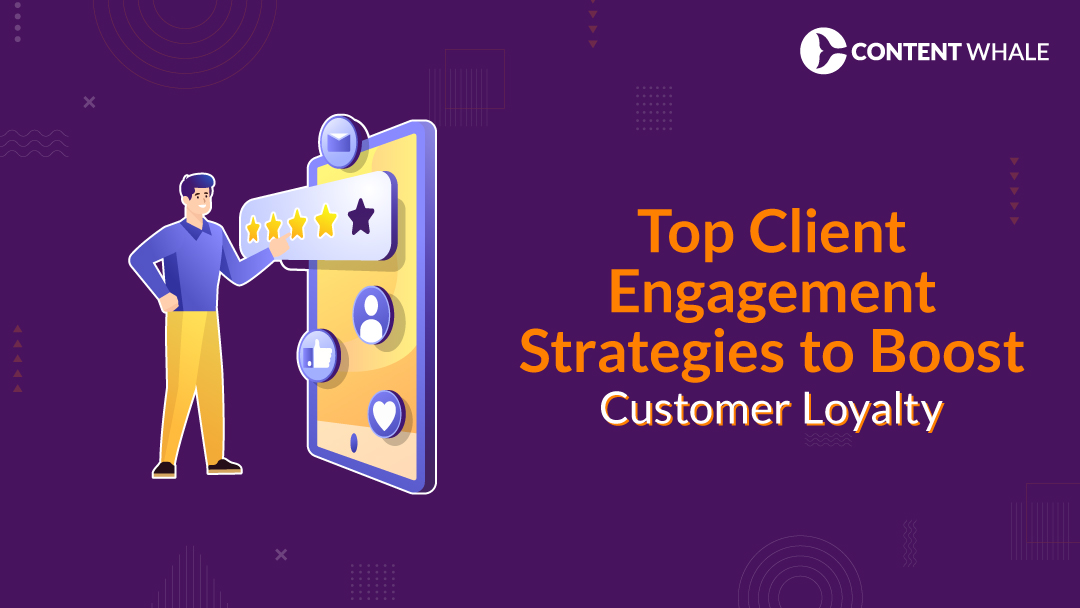Client engagement refers to the ongoing interactions between a business and its clients that aim to create a meaningful and lasting relationship. Engaging clients effectively is essential in today’s competitive market, as it leads to increased customer loyalty and satisfaction. This blog provides an overview of effective client engagement strategies, highlighting their importance and benefits.
Strong client engagement drives higher customer retention, increasing the likelihood of repeat purchases.
Engaged clients are more likely to recommend your business to others, contributing to positive word-of-mouth.
By implementing the right engagement techniques, businesses can build stronger relationships with their clients, ultimately enhancing their brand reputation.
Understanding Client Engagement
Client engagement involves consistent, meaningful interactions that foster a strong relationship between a business and its clients. It’s essential to distinguish between client engagement and customer service. While customer service addresses immediate needs and issues, client engagement strategies focus on building long-term connections through ongoing interactions.
Effective client engagement is vital for business growth. Engaged clients are more likely to remain loyal, reducing churn rates and increasing client retention. They tend to make repeat purchases, contributing to a higher customer lifetime value. Moreover, engaged clients often provide positive feedback and referrals, enhancing your brand’s reputation and attracting new customers.
Understanding the role of engagement techniques in business growth is crucial. By fostering strong relationships, businesses can ensure long-term success and create a loyal customer base. Prioritizing customer engagement can significantly impact your company’s bottom line and drive sustainable growth.
Benefits of Effective Client Engagement

Implementing effective client engagement strategies can lead to numerous benefits for your business. One of the primary advantages is increased client retention. Engaged clients are more likely to remain loyal to your brand, reducing churn rates and ensuring steady revenue. This long-term loyalty is essential for sustaining business growth.
Another significant benefit is a higher customer lifetime value (CLV). Clients who feel connected to your brand are more inclined to make repeat purchases and explore other products or services you offer. By focusing on customer engagement, businesses can maximize the value each client brings over their lifetime.
Positive word-of-mouth and referrals are also key outcomes of strong client engagement. Satisfied clients often share their positive experiences with others, helping you attract new customers without additional marketing expenses. This organic growth can significantly enhance your brand’s reputation.
Furthermore, engaged clients contribute to an enhanced brand reputation. When clients feel valued and heard, they develop a positive perception of your brand. Implementing effective engagement techniques ensures that clients have consistently positive experiences, leading to increased customer loyalty and a stronger market presence.
Key Strategies for Client Engagement
To effectively engage clients, businesses need to adopt a variety of client engagement strategies. Here are some key approaches:
Personalizing Client Interactions
Tailoring communications and offers to meet individual client needs makes clients feel valued and understood, enhancing customer loyalty. Use data and insights to customize emails, recommendations, and services.
Providing Exceptional Customer Service
Outstanding customer service is crucial. Promptly addressing client inquiries and resolving issues demonstrates your commitment to their satisfaction. Excellent customer service forms the foundation of strong customer engagement.
Leveraging Social Media
Social media platforms offer opportunities to interact with clients in real-time, share valuable content, and gather feedback. These interactions help build a community around your brand and foster deeper connections.
Creating Engaging and Valuable Content
Regularly publishing blogs, videos, and newsletters that address client interests and pain points can keep clients informed and interested. Content that educates and entertains can significantly enhance client engagement.
Implementing Loyalty Programs and Rewards
Loyalty programs and rewards encourage repeat business and strengthen client relationships. Offering incentives for continued patronage or referrals can increase client retention and boost overall engagement. These programs make clients feel appreciated and more connected to your brand.
By incorporating these strategies, businesses can build stronger relationships with their clients, leading to sustained growth and enhanced customer loyalty.
Tools and Techniques for Measuring Client Engagement

Accurately measuring client engagement is essential for understanding the effectiveness of your client engagement strategies. Here are some key tools and techniques to help you track and improve customer engagement.
Key Metrics to Track
Tracking the right metrics is crucial for assessing client engagement. Some important metrics include:
- Customer Satisfaction Scores (CSAT): Measures how satisfied clients are with your products or services.
- Net Promoter Score (NPS): Gauges client loyalty by asking how likely they are to recommend your business to others.
- Customer Retention Rate: Indicates the percentage of clients who continue to do business with you over a specific period.
Tools for Monitoring Engagement
Utilizing the right tools can streamline the process of monitoring client engagement. Some useful tools include:
- Customer Relationship Management (CRM) Systems: CRMs like Salesforce or HubSpot help track client interactions, manage communications, and analyze engagement data.
- Analytics Tools: Platforms like Google Analytics provide insights into client behavior on your website, helping you understand what content and features are most engaging.
- Survey Tools: Tools like SurveyMonkey or Qualtrics allow you to collect direct feedback from clients, providing valuable insights into their satisfaction and engagement levels.
Methods for Collecting Client Feedback and Insights
Regularly gathering feedback is vital for understanding client needs and improving customer engagement. Some effective methods include:
- Surveys and Questionnaires: Distribute surveys to gather detailed feedback on various aspects of your business.
- Customer Interviews: Conduct one-on-one interviews with clients to gain deeper insights into their experiences and expectations.
- Social Media Monitoring: Track client interactions and mentions on social media platforms to understand their sentiments and preferences.
By implementing these tools and techniques, businesses can effectively measure client engagement and make informed decisions to enhance customer loyalty and client retention.
Tips for Maintaining Long-Term Client Relationships

Sustaining long-term client relationships is essential for maximizing the benefits of your client engagement strategies. Here are some effective tips to ensure lasting connections with your clients:
Regularly Communicate with Clients
Consistent communication helps keep your clients informed and engaged. Regular updates through emails, newsletters, and social media ensure clients feel connected and valued. Timely communication is key to maintaining strong customer engagement.
Offer Value Through Educational Content and Resources
Providing clients with valuable content and resources can significantly enhance their experience with your brand. Educational materials such as how-to guides, webinars, and industry insights help clients get the most out of your products or services. This approach strengthens customer loyalty and fosters deeper relationships.
Solicit and Act on Client Feedback
Actively seeking client feedback shows that you value their opinions and are committed to improving their experience. Use surveys, questionnaires, and direct interactions to gather insights. More importantly, act on this feedback to address any issues and demonstrate your dedication to client satisfaction. This practice supports effective client retention.
Build Trust Through Transparency and Reliability
Trust is a cornerstone of any strong relationship. Be transparent about your processes, policies, and any changes that might affect your clients. Additionally, consistently deliver on your promises to establish reliability. Trustworthy and reliable businesses foster long-term customer loyalty.
Implementing these tips will help maintain robust client relationships, ensuring that your client engagement strategies continue to yield positive results. By prioritizing customer engagement and focusing on these key areas, businesses can achieve sustained client retention and loyalty.

Client engagement is vital for fostering loyalty and sustaining business growth. Effective client engagement strategies are essential for building strong relationships with your clients. By implementing personalized interactions, exceptional customer service, and engaging content, businesses can significantly enhance customer engagement.
Measuring engagement through key metrics and utilizing the right tools ensures that your strategies are effective and can be continuously improved. Regular communication, offering valuable educational content, and acting on feedback are fundamental for maintaining long-term client relationships.
Strong client engagement leads to increased client retention, higher customer lifetime value, and a better brand reputation. By prioritizing these strategies and focusing on genuine connections, businesses can achieve lasting customer loyalty and sustained success.

What is client engagement?
Client engagement involves ongoing interactions between a business and its clients that create meaningful and lasting relationships. Effective client engagement strategies are essential for building these connections and enhancing customer loyalty.
Why is client engagement important?
Client engagement is important because it leads to increased client retention, higher customer lifetime value, and positive word-of-mouth. Engaged clients are more likely to stay loyal to your brand and recommend it to others.
How can I measure client engagement?
Measuring client engagement involves tracking key metrics such as customer satisfaction scores, Net Promoter Scores (NPS), and retention rates. Utilizing tools like CRM systems and analytics platforms can help monitor these metrics effectively.
What are some strategies for engaging clients?
Some effective client engagement strategies include personalizing client interactions, providing exceptional customer service, leveraging social media, creating valuable content, and implementing loyalty programs. These engagement techniques help build strong, lasting relationships with clients.
How can I maintain long-term client relationships?
To maintain long-term client relationships, regularly communicate with clients, offer valuable educational content, solicit and act on feedback, and build trust through transparency and reliability. These practices support sustained customer engagement and client retention.





